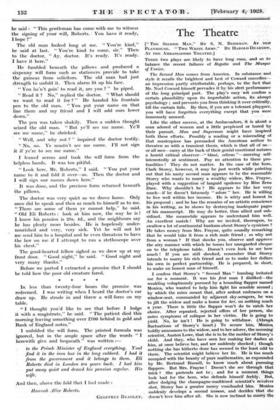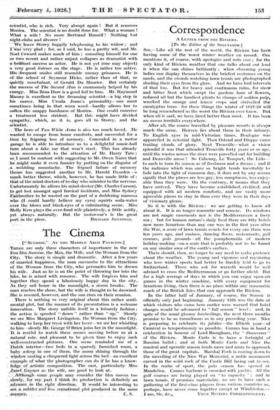The Theatre .
[" THE SECOND MAN." BY S. N. BEHRMAN. AT PLAYHOUSE. " Two WnrrE Aims." BY HAROLD DEARDEN.
AT THE AMBASSADORS THEATRE.] .
THESE two plays are- likely .to have long - runs, nil& so to balance . the recent failures of Regatta and The Masque
of Venice. .
The Second Man comes from America. In substance and style it recalls the brightest and best of Coward comedies— an -impression partly attributable, perhaps, to the fact that Mr. Noel Coward himself pervades it.by his alert performance of the long principal part. The play's easy wit confers a certain-- plausibility upon its improbable action, its abrupt psychology ; and prevents you from thinking it over critically, till the curtain falls. By then,-if you are a tolerant playgoer, you will have forgotten everything except that you were immensely amused. • •
Like the other success, at the Ambassadors, it is abont a man adored of women and a little perplexed or bored by their pursuit. Man and Superman might haVe inspired both these, efforts. Possibly a reading or a • misreading of that masterpiece has persuaded the American author to threaten us with a transient thesis, which is that all of us— Or all men—carry at the back 'of their genial 'emotional natures a horrid critical observer—" blas43,. -odious "—sneering- self- interestedly at sentiment. Pay no attention to these pro- fundities ! They do not matter. In the case of the hero, Clark Storey, however, it may be just worth while pointing out that his nasty second man appears to be the reasonable Storey who wants to marry a wealthy widow, Mrs. -Frayne, played with a suggestion of languid opulence by Miss Zena Dare. Why shouldn't he? He appears to like her Very much—if he doesn't fatuously " adore " 'her. He is willing to live well within her income. He is witty and honest in his proposal ; and he has the remains of an artistic conscience in his writing, as he shows by destroying inadequate pages of his manuscript. He may do better, thus allied and -sub- sidized. She meanwhile appears to understand him well. An excellent match ! Why are we invited, thereupon; •to swallow a lot of sentimental bunkum about Storey's cynicism ? He takes money from Mrs. Frayne, quite-soundly remarking that he would take it from a rich male friend ; so why not from a woman ? If that shocks you, observe and approve the airy manner with which he tosses her unregarded cheque on to the telephone table. Doesn't even look to see how much ! If you are still shocked, remember that Storey intends to marry his rich friend and so to make her dollars his own in perfect partnership. He is prepared, in short, to make an honest man of himself.
I confess that Storey's " Second Man " humbug irritated me for a moment. 'It was his first- man I disliked—the weakling voluptuously pursued by a bounding flapper named- Monica, who wanted to help him fight his sensible second ; by which the minx meant that, after ardent embraces on a window-seat, commanded by adjacent sky-scrapers, he wary to jilt the widow and 'make a home for her, on nothing much a year. There is little the flapper won't do to catch- her choice. After repeated, rejected offers of her person,- she notes symptoms of collapse in her victim. He is going to yield. No, he isn't !. He is going to withdra w. (Abrupt fluctuations 'of Storey's heart.) To secure him; • Monica boldly announces to the widow, and to her adorer, the mooning scientist; Austen Lovie, that she is to be the mother of Storey's child. And they, who have seen her making her dashes at him, at once believe her, and .are suddenly shocked ; though nothing she hag hitherto done has seemed in the least odd to thein. The scientist might believe her lie. 'He is too much Occupied- with the beauty of pure Mathanaties, as expounded by Mr. Bertrand ' to know 'much • about pursuing flappers. But Mrs. Frayne ! Doesn't she see thrOngh that trick ? She pretends not to ; and for a moment things look bad for the _hero, who defends himself feeblY. 'But, after dodging the champagne-maddened scientist's teVolver shot, Sthrek las a greater mercy' votieltsafed him. Monica 'suddenly develops a second woman,- and' deeideif that she doesn't love him after all. She is now inclined to intirrY the
scientist, who is rich. Very abrupt again ! But it removes Monica. The scientist is no doubt done for. What a Woman ! What a wife ! No more Bertrand Russell ! Nothing but night-clubs and divorce !
""We leave 'Storey happily telephoning to his' widow ; and 144A very glad ;- for, as I said, he has a pretty wit, and Mr. Noel Coward makes much of him ; consoling himself for one or :twO- recent and rather unjust collapses as dramatist with a brilliant success as actor. He is not yet (one may object) a very good listener on-the stage. He is rather too active. His :frequent smiles still resemble uneasy grimaces. He is of: the -school of . Seymour Hicks, rather than of that, so -quietly , nonchalant, of Gerald Du Maurier. But- certainly the success of -The Second Man is enormously helped by his energy:, Miss Zena Dare is a good foil to him. Mr. Raymond Masseyis excellent as the dreaming scientist—a big step in his career. Miss Ursula Jeans's personality—one must sometimes- bring in that• worn word—hardly allows her to soften the snappy harshness of Monica. One could conceive a treatment less strident. But this might have divided sympathy, which, as it is, goes all to Storey, and the :scientist.
The hero of Two White Arms is also too much loved. He :wanted. to escape from home comforts, and succeeded for a -time by feigning- loss of memory. Concealed in a motor garage he is able to introduce us to a delightful music-hall turn :about a fake car that won't start. This has already been -recommended to the attention of Mr. Harry Tate ; so,I must be content with suggesting to Mr. Owen Nares that he: might: make it even funnier by putting on the disguise of :wobbling moustache. The feigned failure of memory theme has suggested another to Mr. Harold Dearden—a much better theme, which, however, he has made little of ; that of the mind-doctors of to-day who minister to the nervous. Unfortunately he allows his mind-doctor (Mr. Charles Carson), to get-lost amongst aged farcical incidents, and Miss Sydney Fairbrother to be wasted on the part of a doddering mamma ,who ;could hardly believe my eyes) squirts soda-water :over the blows and black-eyes of a culminating scene. Miss -Molly Kerr plays the over-fond wife plaintively, a little acidly, yet .always naturally. But the motor-car's is the great







































 Previous page
Previous page